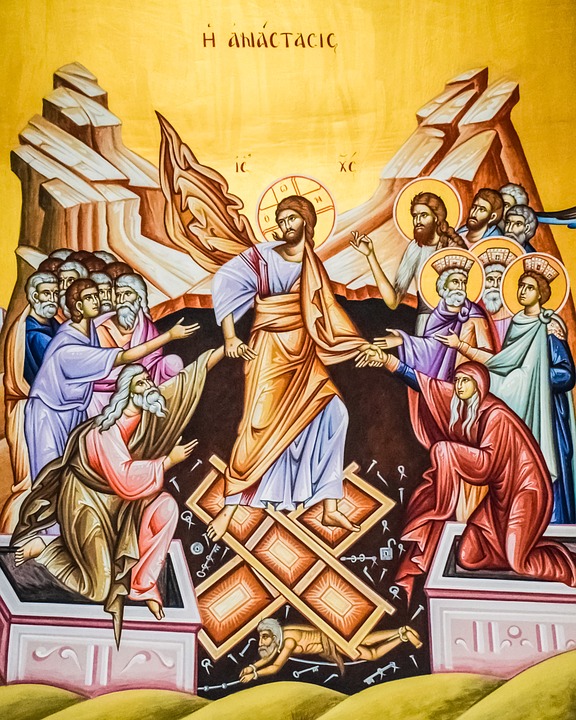That very day two of them were going to a village named Emmaus, about seven miles from Jerusalem, and talking with each other about all these things that had happened. While they were talking and discussing together, Jesus himself drew near and went with them. But their eyes were kept from recognizing Him. And He said to them, “What is this conversation which you are holding with each other as you walk?” And they stood still, looking sad. Then one of them, named Cleopas, answered Him, “Are you the only visitor to Jerusalem who does not know the things that have happened there in these days?” And He said to them, “What things?” And they said to Him, “Concerning Jesus of Nazareth, who was a prophet mighty in deed and word before God and all the people, and how our chief priests and rulers delivered Him up to be condemned to death, and crucified Him. But we had hoped that He was the one to redeem Israel. Yes, and besides all this, it is now the third day since this happened. Moreover, some women of our company amazed us. They were at the tomb early in the morning and did not find His body; and they came back saying that they had even seen a vision of angels, who said that He was alive. Some of those who were with us went to the tomb, and found it just as the women had said; but Him they did not see.” And He said to them, “O foolish men, and slow of heart to believe all that the prophets have spoken! Was it not necessary that the Christ should suffer these things and enter into his glory?” And beginning with Moses and all the prophets, He interpreted to them in all the scriptures the things concerning Himself. So they drew near to the village to which they were going. He appeared to be going further, but they constrained Him, saying, “Stay with us, for it is toward evening and the day is now far spent.” So He went in to stay with them.
Luke 24:13-29 (From the Fifth Eothinon Gospel)
Christ is Risen!
The “Walk to Emmaus” is an experience of Christian spiritual renewal that often takes place over the period of a few days. It is generally done with a sponsor and is designed to get the participants to enter a deeper relationship with Christ and a more committed relationship to the church. Mentoring, discipleship and small groups are components of the “walk to Emmaus” experience.
The roots of this “Emmaus” experience are in the Catholic Church, though primarily this is something done today in Protestant Churches. In the Orthodox Church, there is no official “Emmaus” experience.
The “Emmaus” experience is based on today’s scripture passage, where two disciples, Cleopas (who is named) and another disciple (who is not named but is traditionally held to be St. Luke) were walking towards the village of Emmaus, which was seven miles from Jerusalem, on the afternoon after the Resurrection. They were talking with each other about the things that had happened in Jerusalem. A stranger appears and joins their conversation. The stranger is Jesus, but the Disciples do not recognize Him. He asks questions about what happened in Jerusalem. The Disciples struggle to put together the significance of the events. They portray a level of confusion to the “stranger” in their midst. Jesus even goes so far as to explain the scriptures to them, all the things concerning Himself. And still the Disciples don’t recognize Him. However, they enjoy His company and as the day is coming to a close, they invite Him to stay with them so that they can hear more.
If there is anything resembling the “Walk to Emmaus” in Orthodoxy, it would be our recently completed Holy Week journey. Over a period of many days, we’d had the opportunity for spiritual renewal. We’ve heard the scriptural accounts of the Passion and Resurrection of Christ again. We’ve heard them not only in Gospel readings, but in Old Testament prophecies and in hymns. In a sense, we are like the Disciples walking down the road with a “stranger” (Jesus) and again hearing the story and trying to put it all together.
Hopefully this year, you’ve taken a few steps further in your journey to salvation. Hopefully you’ve understood this year, a few steps deeper, the meaning of Christ’s dead and Resurrection. In some ways, however, we are still like the Disciples on the road. We haven’t put it all together. So, what is solution to our state of confusion? To ask Christ to stay with us. To continually ask Him to be in our hearts through prayer and through worship.
There is a tendency after Pascha for churches to be empty, for people to stay away. This is precisely the time when they should be filled, with people who have learned, but who desire to learn more. The “Emmaus” experience in the Orthodox Church is not necessarily about people who are lost and need finding. Rather it is about people who know something about Christ and who want to know more. And this experience does not need to be limited (and should not be limited) to Holy Week. Rather it is an experience that we should walk constantly. We should walk a journey with Christ, and also with friends who can encourage and accompany us in this walk.
O Christ, how wise are Your judgments. By the grave clothes alone You made Peter understand Your resurrection. Accompanying Luke and Cleopas, and while conversing with them You did not reveal Yourself immediately. Therefore, You were reproached as a stranger in Jerusalem, not knowing what had taken place there. But disposing everything for the benefit of Your creature, You revealed the prophecies concerning You and made Yourself known to them by blessing the bread because their hearts were aflame for knowledge of You even before this. To the disciples already assembled they openly proclaimed Your Resurrection; through it have mercy on our souls. (Fifth Eothinon Doxastikon, Trans. by Holy Cross Seminary Press, 1991)
Make sure you attend church today!



